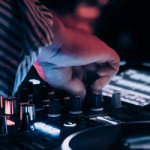In 2024, DJs face a crucial decision: should they opt for DJ software or hardware? This dilemma has become increasingly relevant as technology continues to advance, offering DJs a myriad of options for music mixing and performance. Understanding the difference between DJ Software vs Hardware, along with the pros and cons of each, is essential for making an informed choice that aligns with individual preferences and needs.
In this blog, we will delve into understanding the difference between DJ Software vs Hardware, exploring the features of DJ mixer software and hardware options, and weighing the pros and cons of each. Whether you’re a beginner DJ looking to kickstart your career or a seasoned professional aiming to upgrade your setup, this guide will provide valuable insights to help you navigate the DJing landscape effectively.
Table of content
Why are DJs Trending
DJ Physical Mixers or DJ Software
Difference Between DJ Hardware and Softwares
Using Both Can be a Secret to Unlock Success
Why are DJs Trending?
DJs are trending for several reasons, with one significant factor being their adaptation to evolving audience preferences. In recent years, there has been a noticeable shift towards more immersive and engaging live performances. DJs are now incorporating advanced visual elements into their sets, such as intricate light shows, 3D mapping projections, and interactive displays. These visual components not only complement the music but also create a multisensory experience for the audience, enhancing the overall impact of the performance.
Moreover, advancements in technology have made it easier for DJs to integrate these visual elements seamlessly into their sets. With the availability of powerful software and hardware tools, DJs can now create stunning visual effects in real-time, synchronized perfectly with the music and their DJ setup. This level of synchronization allows for a deeper connection between the auditory and visual components of the performance, resulting in a more immersive and captivating experience for the audience.
DJ Physical Mixers or DJ Software?
The world of DJing presents a fascinating dichotomy between traditional physical DJ mixers and modern DJ software, sparking an ongoing debate among DJs worldwide. Both avenues offer distinct advantages and drawbacks, appealing to different tastes and requirements within the DJing community.
Pros and Cons of DJ Hardware / Physical DJ Mixers:
Pros:
- Tactile Control: Physical DJ mixers offer tactile control over the music, allowing DJs to manipulate knobs, faders, and buttons with precision.
- Reliability: Hardware setups are generally more reliable than software-based solutions, as they are not prone to crashes or technical glitches.
- Professional Feel: Many DJs prefer the feel of physical knobs and faders, as it provides a more tactile and immersive experience.
- Durability: Quality DJ hardware is built to withstand the rigors of live performances, making it a long-lasting investment.
Cons:
- Cost: High-quality DJ hardware can be expensive, especially when considering the additional costs of accessories and peripherals.
- Limited Features: While physical mixers offer tactile control, they may have limited features compared to software-based solutions.
- Portability: Hardware setups are often bulky and less portable than software-based setups, making them less suitable for mobile DJs or those who travel frequently.
- Learning Curve: Mastering the intricacies of physical mixers requires time and practice, which may deter beginners or those accustomed to software-based DJing.
When it comes to DJ hardware, industry leaders like Pioneer DJ and Native Instruments offer a range of options, from versatile MIDI controllers to professional-grade CDJs. These top-quality hardware solutions provide tactile control and reliable performance, catering to DJs of all skill levels and styles. Check out our list of the best DJ Hardwares to find the perfect fit for your DJing needs. Click here to learn more about the best DJ Hardware.
Pros and Cons of DJ Software:
Pros:
- Versatility: DJ software offers a wide range of features and capabilities, allowing DJs to create complex mixes and incorporate various effects.
- Cost-Effective: Many DJ software options are available at a fraction of the cost of hardware setups, making them accessible to a wider audience.
- Portability: With the rise of laptop DJing, software-based setups offer unparalleled portability, allowing DJs to perform virtually anywhere.
- Integration: DJ software often integrates seamlessly with other digital tools and platforms, offering enhanced flexibility and connectivity.
Cons:
- Reliability: Software-based setups are susceptible to crashes, glitches, and compatibility issues, which can disrupt performances.
- Learning Curve: Mastering DJ software requires familiarity with digital interfaces and workflows, which may pose a challenge for some DJs.
- Lack of Tactile Feedback: While software interfaces can mimic physical controls, they may not offer the same tactile feedback as physical mixers, leading to a less intuitive experience for some DJs.
- Hardware Dependence: Software-based setups rely on compatible hardware for optimal performance, which may limit flexibility and scalability.
When it comes to DJ software, there’s a plethora of options available, each with its own unique features and capabilities. From industry-standard software to innovative newcomers, there’s something for every DJ’s style and preference. Check out our list of the best DJ software to find the perfect fit for your DJing needs. Click here to learn more about the best DJ software.
In the ongoing debate of DJ Software Vs Hardware, the choice ultimately comes down to personal preference, budget, and intended use. Some DJs may prefer the tactile feel and reliability of physical mixers, while others may favor the versatility and portability of DJ software. Ultimately, both options offer unique advantages and challenges, and the best choice depends on the individual needs and preferences of the DJ.
Difference Between DJ Hardware and Softwares
Here’s a comparison between DJ hardware and software:
| Aspect | DJ Hardware | DJ Software |
| Tactile Control | Physical knobs, faders, and buttons offer precise manipulation of music elements. | On-screen controls or external MIDI controllers provide tactile interaction with digital interfaces. |
| Reliability | Generally, more reliable, with fewer crashes or technical glitches. | Susceptible to crashes, glitches, and compatibility issues, impacting performance reliability. |
| Professional Feel | Offers a tactile and immersive experience, akin to traditional DJ setups. | May lack the tactile feedback of physical controls, leading to a less intuitive experience. |
| Durability | Built to withstand the rigors of live performances, providing long-lasting durability. | Reliant on compatible hardware, which may vary in quality and durability. |
| Cost | Initial investment can be high, especially for quality hardware and peripherals. | More affordable, with many options available at a fraction of the cost of hardware setups. |
| Features | While tactile, physical mixers may have limited features compared to software solutions. | Offers a wide range of features and capabilities, catering to diverse mixing needs. |
| Portability | Often bulkier and less portable, making them less suitable for mobile DJs or frequent travellers. | Offers unparalleled portability, especially with the rise of laptop DJing and compact controllers. |
| Learning Curve | Requires time and practice to master the intricacies of physical mixers. | Requires familiarity with digital interfaces and workflows, which may pose a learning curve for some DJs. |
| DJ Instruments | Incorporates physical DJ instruments such as turntables, mixers, and CDJs for tactile control. | Utilizes digital DJ instruments, including MIDI controllers and software-based interfaces. |
Using Both Can be a Secret to Unlock Success?
Using both physical DJ mixers and DJ software in tandem can be a strategic approach to maximizing your DJing potential. Each option offers distinct advantages: physical mixers provide tactile control and a professional feel, while DJ software offers versatility and portability. By leveraging the strengths of both, DJs can create dynamic performances that cater to diverse audiences and venues. Physical mixers allow for precise manipulation of knobs, faders, and buttons, enhancing the DJ’s ability to craft seamless transitions and intricate mixes. On the other hand, DJ software provides access to a wide range of features, effects, and digital tools, empowering DJs to experiment with new sounds and techniques.
AAFT Online’s comprehensive Online DJ Course is designed to help DJs harness the power of both hardware and software. Through expert-led instruction and hands-on training, students learn how to seamlessly integrate physical mixers with DJ software, unlocking new levels of creativity and innovation in their performances. Whether you’re a beginner looking to master the basics or an experienced DJ seeking to refine your skills, AAFT Online’s course provides the knowledge and techniques needed to excel in the world of DJing. With a focus on practical application and real-world scenarios, students graduate equipped to navigate the complexities of modern DJ setups and deliver captivating performances that leave a lasting impression.
Final Verdict
In the realm of DJing, the choice between using DJ software or hardware has long been a topic of debate. Each option presents its own set of advantages and limitations, catering to different preferences and styles of DJs. Hardware, such as physical mixers and controllers, offers tactile control and a sense of professionalism, making it ideal for DJs who prefer a hands-on approach. On the other hand, DJ software provides unparalleled versatility and portability, allowing DJs to perform virtually anywhere with just a laptop and controller.
While some DJs swear by the reliability and authenticity of hardware setups, others opt for the convenience and flexibility of software-based solutions. However, the line between the two is increasingly blurred, with many DJs incorporating elements of both into their setups. Ultimately, the choice between DJ software and hardware boils down to personal preference, budget, and the specific needs of each DJ. Whether you’re a seasoned pro or just starting out, exploring both options can help you find the perfect balance between creativity, functionality, and performance.
























